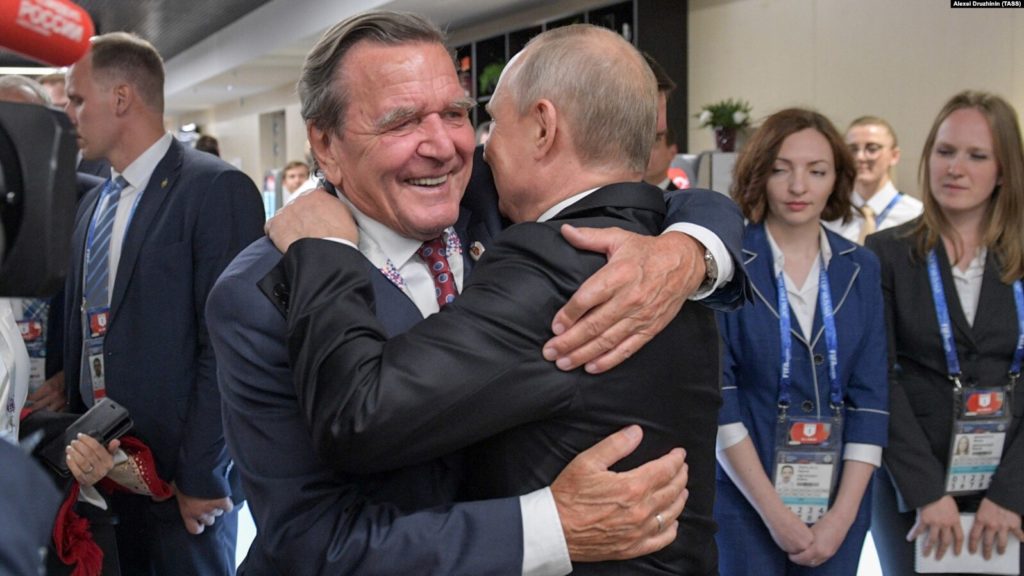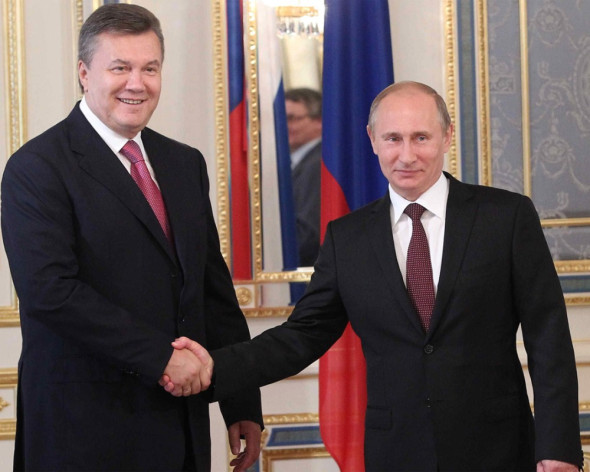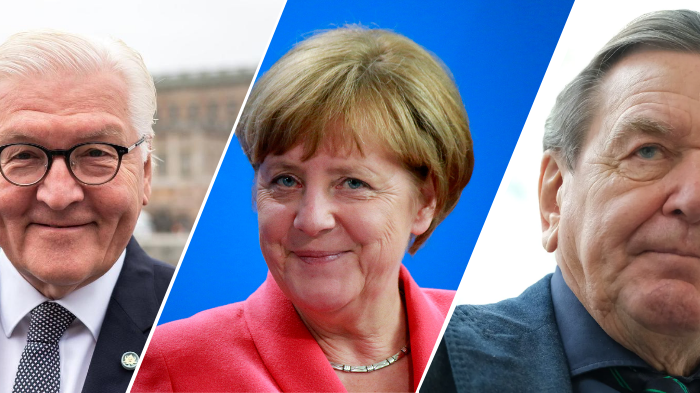Russia's invasion of Ukraine has prompted soul-searching and recriminations among Germany's political, media, and academic establishments. After years of advocating Ostpolitik diplomacy as sufficient to manage Russia, Germany's elites are asking: How could we have been so wrong?
Chancellor Olaf Scholz responded with a dramatic reversal, dubbed the Zeitenwende (historic shift). This includes pledging €100 billion for defense spending.
Germany's entanglement with Russia didn't occur overnight. Russia courted German influencers with a spectrum of tactics, from direct bribery to long-term cultivation, influencing officials, scientists, journalists, and even heads of the German government.
During her tenure as Chancellor from 2005 to 2021, Angela Merkel obstructed NATO's consideration of Ukraine's membership. Despite Russia's actions in Georgia, Syria, Crimea, Donbas, and the downing of MH-17, Merkel approved the controversial Nord Stream 2 project in 2015.

Current German President Frank-Walter Steinmeier advocated for Germany's energy alliance with Russia and pushed diplomatic solutions on Ukraine, including the Steinmeier Formula, consolidating Russia's influence.
Gerhard Schroeder, Chancellor from 1998 to 2005, maintained close ties with Russian state-owned energy companies post-public office, defending Russia's President Vladimir Putin in the West.
According to Nathalie Vogel of the Center for Intermarium Studies in Washington, Russia prioritizes leveraging psychological manipulation over bribery. Long-term cultivation enables building extensive profiles on targets. In an interview with the European Resilience Initiative Center, Vogel explains why Russian influence in Germany persists post-invasion in Ukraine. We summarized it for you.

Gerhard Schroeder: the triumph of Russia's tradition of influence
Europe's most successful Russian intelligence operation involves co-opting entire political parties and cultivating prominent leaders. Former Chancellor of Germany Gerhard Schroeder stands out as a prime example. Post-public office, Schroeder has been associated with Russian state-owned energy companies like Nord Stream AG, Rosneft, and Gazprom. A personal friend of Russia’s President Vladimir Putin, Schroeder's early identification and cultivation by Russian agents underscore the effectiveness of this long-standing tradition.
"I think they spotted him in his younger student years. He was more inclined to collaborate with the Soviet Union and had a certain disdain for anything American. This hasn't gone unnoticed, as there are ways of cultivating such people," said Nathalie Vogel.

Schroeder's election as German Chancellor was already a Russian success. The rest was an easy exercise for anyone who graduated from the KGB school.
Uncovering decades of Russian cultivation tactics
Russian intelligence uses sophisticated strategies to approach individuals, with bribery and blackmail being less common tactics.
-
Courting people at academic conferences
The Russians use academic conferences to recruit people as intelligence assets. They may approach attendees directly or use non-Russian proxies. Targets tend to be narcissistic yet insecure academics who crave validation. The concept of "access academia" involves building careers based on connections rather than academic merit.
"You have mediocre university professors who, because they were singing the right tune, have seen certain doors opening and got invited in some flying circles to high-ranking conferences in Russia. And that's the purpose of Valdai [annual international conference in Russia]. Valdai is a huge shopping mall for Russian intelligence," explained Vogel.

Vulnerable individuals, such as provincial scholars lacking extensive travel experience or linguistic skills, become targets for psychological warfare. Detecting vulnerabilities like narcissistic personality disorders or social complexes becomes a key aspect.
This may be a professor from a provincial university suddenly invited to speak with Russian ministers despite lacking expertise or ties to Russia. This terra incognita provides fertile ground for ideological programming and manipulation. Russians brush his ego and make him feel special.
"The Russian narrative in such cases is always: "You are very special, you understand us much better than the others,""You are not so ideologically influenced, you are more balanced," elaborated Vogel.
-
Pampering method
Russians usually employ a pampering method when they deal with people who willingly share their propaganda.
"They would say, "Look, it's so rare to have people who master the subject so well, and you have such an in-depth understanding of the issues, and you are not ideological at all. So, we can work, and if you want access to…", and you name it," explained Vogel.
It's easy for counterintelligence to spot if someone is being courted and cultivated. For instance, if a mid-tier scientist suddenly receives invitations to exclusive events, enjoys a stay at a five-star hotel in Greece, and travels first class, it raises red flags.
-
‘Honey traps’
While "honey traps" involving seduction, kompromat, or blackmail exist, the primary approach is to assist individuals in their careers. Sometimes, Russians go even further.
"For example, somebody is in an international organization dealing with the Russians. They create fake obstacles and then they make sure that this person is the one that succeeds in doing away with these obstacles. So, this person is viewed by their organization as someone who really can deal with the Russians. Germany and Austria are full of them," said Vogel.
This tactic is especially prevalent with politicians and backbenchers seeking notoriety.
Russian cultivation techniques are thorough, spanning decades rather than just a year. Defectors often carry files that reveal individuals spotted and cultivated since the 70s or 80s. This meticulous, long-term approach is a crucial strategy.
Paper tigers: German agencies 'castrated' by law
Discovering patterns and identifying individuals is straightforward, yet Western intelligence often fails to counteract. Why?
In Germany, there are two types of counterintelligence: the Verfassungsschutz, which works within Germany, and the BND, which handles foreign intelligence. They struggle due to legal constraints, turning them into "paper tigers" despite their expertise.
“The control mechanisms literally castrated the counterintelligence. It's not that there is no analytical expertise, and it's not that those people don't know their job. They actually do know their job, because West Germany has been fighting the Stasi until 1989,” noted Vogel.

The limitations become evident when members of the German parliament lack security clearance, assuming legitimacy from the people. However, counterintelligence faces challenges if a political party is infiltrated by Russian intelligence. Phone tapping is illegal, and obtaining authorization takes time, hindering effective counterintelligence.
“In counterintelligence, time is everything. The best counterintelligence is actually ahead of time. Also it's very hard to prosecute cases like that,” explained Vogel.
However, German politicians are being monitored by foreign intelligence services from allies, as hostile activities in Germany may threaten their countries. The famous paradox is that the US National Security Agency (NSA) effectively counters Russian influence in Germany because it operates without constraints on spying on foreign citizens or territories.

In areas like counterterrorism, Germany relies on foreign intelligence agencies, including data collection, signals intelligence, and operational support from allied services, ensuring the protection of German citizens.
Despite this collaboration, public sentiment, influenced by media and propaganda, often negatively portrays entities like the US NSA. The Snowden affair exacerbated this perception, with former Chancellor Merkel's statement, "We don't spy among friends," contributing to strained relations.
“If we are to go down that line, the German BND has collected data on [two US secretaries of state] John Kerry and Hillary Clinton. Of course, they claim it was unintentional, yes, but I’ve got a bridge to sell you,” said Vogel.

Russian tentacles still grip Germany
The German intelligence services operate as a massive bureaucracy, resistant to disruption and widely perceived as dysfunctional. Many American professionals in the field view German agents as bureaucrats who think they are James Bonds, and little has changed since Russia invaded Ukraine.
Ex-CIA operative John Sipher argues that German intelligence services display unprofessionalism and arrogance, particularly concerning Russia and Putin. There's a reluctance to confront inconvenient truths, as taking action on such information is something both the Chancellor's office and the government seek to avoid.
“German agents are being stopped by politicians, who seem reluctant to admit that Putin may be up to something evil. And so the German agents have stuck their heads in the sand. Analysts from Germany’s BND, working in the Russia department, are completely useless,” Sipher told German Focus weekly.

German intelligence services also lack expertise, starting with cultural and linguistic expertise. Leadership roles in departments dedicated to monitoring countries like China often go to people who cannot read or speak the language, even though this would not happen in the US or UK intelligence agencies.
Testing Germany's Russian expertise
Despite Germany's claims of having significant expertise in Russia due to unique access to the Kremlin, recent events cast doubt on this assertion. The BND, for instance, was reportedly unaware of the attempted coup in Russia by Wagner group boss Yevgeny Prigozhin until it unfolded in June. In 2014, during the critical moment when then-President of Ukraine Viktor Yanukovych was fleeing to Russia, the BND failed to respond to urgent calls from Kyiv and Berlin, citing the end of the working day. Critics point out that one of the core issues with the BND lies in its analysis of Russia.

"Even in the latest book of Gerhard Schindler [a former head of the BND] there is a chapter where he says, "My God! We have such great Russian expertise! We have such unique access to the Kremlin that we get information no others have!" noted Vogel.
This overconfidence might have played a role in the BND's surprise when Russia invaded, leaving agency’s head Bruno Kahl stranded in Kyiv for two days.

Learning from mistakes
In a recent opinion piece, former BND heads August Hanning and Gerhard Schindler proposed placing the agency under Defense Ministry control to avoid politicization by the chancellery. This move aims to address concerns, such as the Schroeder case, where German intelligence knew of Russian cultivation but failed to take action.
“You're head of division for internal security, and your boss is the Chancellor, and your witness is being recruited; he's being cultivated and opening doors with the Russians walking in. What are you going to do? You're certainly not going to risk your job,” elaborated Vogel.

Beyond Russia, the German parliament Bundestag is filled with potential security risks - "a theme park for foreign intelligence," as Vogel described. There are red flags in many MPs' backgrounds, yet intelligence services overlook this.
"Someone in a foreign affairs committee, a defense committee, an intelligence committee, and shares information with non-allies is a criminal. You do not endanger the national security of a country because you don't like your intelligence services. And this is what is happening in Germany," stated Vogel.

Germans don't demand change as spy agencies have bad press. Germany needs honest reporting and expertise of people who have an unbiased approach to intelligence services and understand that they are as necessary as the fire department. Political parties must convey this importance, as Germans desire a safe world but are reluctant to invest in safety. This is evident in the resistance to NATO's 2% benchmark and support for national intelligence services.
“They want to take their train and board their planes without fearing being the victims of a terrorist attack. But they don't want to know who made sure that no terrorist attack happened. It's like they say in German, they like the sausage, but they don't want to know how it's made,” concluded Vogel.
At last, Germany must get serious about its national security.
Read more:
- VSquare: Russian spies still call Brussels home
- Switzerland hosts 80 of Russian 400 spies across Europe
- UK to try five suspected Russian spies next year

